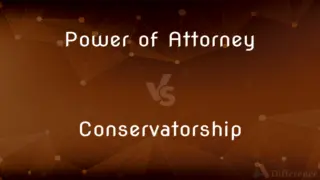Reoccur vs. Recur — What's the Difference?
By Fiza Rafique & Urooj Arif — Updated on March 11, 2024
Reoccur refers to something happening again, possibly by chance, while recur indicates a more frequent or regular repetition of an event.

Difference Between Reoccur and Recur
Table of Contents
ADVERTISEMENT
Key Differences
Reoccur implies that an event or situation happens again at least once, but without a predictable pattern or inherent regularity. It suggests a possible element of chance or randomness in the repetition. On the other hand, recur denotes a tendency for repetition, often at regular intervals or under specific conditions, suggesting a degree of predictability or regularity.
The term "reoccur" is often used in contexts where an event happens again but is not expected to keep happening. In contrast, "recur" is used when an event is part of a cycle or pattern, indicating that it may happen repeatedly over time.
While reoccurrence might be used to describe isolated incidents that happen more than once, recurrence is typically associated with ongoing issues or conditions, such as in medical or natural phenomena, where regularity or predictability is observed.
The choice between "reoccur" and "recur" can also be influenced by the context in which they are used. For instance, in medical or scientific contexts, "recur" is often preferred to describe conditions or events that have a tendency to repeat, whereas "reoccur" might be used in more general or less technical discussions.
Understanding the subtle difference between these terms can help in conveying the correct frequency, regularity, and expectation of an event's repetition, enhancing clarity and precision in communication.
ADVERTISEMENT
Comparison Chart
Definition
Happening again, possibly by chance
Frequent or regular repetition
Regularity
Lack of inherent regularity
Implies regular intervals or conditions
Context
Isolated incidents, chance repetitions
Ongoing issues, cyclical patterns
Usage
General, less technical discussions
Preferred in medical, scientific contexts
Implication
Possible element of randomness
Degree of predictability, cyclic nature
Compare with Definitions
Reoccur
Suggests a chance of repetition.
The problem may reoccur, but it's not certain.
Recur
Regular or predictable repetition.
The symptoms recurred every few months.
Reoccur
Used for isolated incidents.
The mistake reoccurred in several documents.
Recur
Used for ongoing conditions.
If the condition recurs, treatment will be necessary.
Reoccur
Less about predictability.
The power outage reoccurred, surprisingly.
Recur
Indicates expectation of repetition.
The issue is likely to recur under similar conditions.
Reoccur
Implies potential for repetition.
There's a risk that such errors could reoccur.
Recur
Associated with cycles or patterns.
The festival recurs annually.
Reoccur
Event happening again without a pattern.
The issue reoccurred despite initial repairs.
Recur
Often used in technical, medical contexts.
Recurrent infections require further investigation.
Reoccur
To occur again.
Recur
To happen or occur again or repeatedly
The pain recurred after eating.
Reoccur
To occur again; to recur.
Recur
To return to one's attention or memory
The thought recurred to her late at night.
Recur
To return in thought or discourse
He recurred to the subject right after dinner.
Recur
(Archaic) To have recourse; resort
"When ... direct taxes are not necessary, they will not be recurred to" (James Madison).
Recur
(intransitive) To happen again.
The theme of the prodigal son recurs later in the third act.
Recur
To come to the mind again.
Recur
(dated) To speak, write or think about something again; to return or go back (to a subject).
Recur
(obsolete) To go back to using or doing something.
Recur
(obsolete) To have recourse (to someone or something) for assistance, support etc.; to turn or appeal to (someone or something).
Recur
(obsolete) To go to a location again; to return (to a place).
Recur
To recurse.
Recur
To come back; to return again or repeatedly; to come again to mind.
When any word has been used to signify an idea, the old idea will recur in the mind when the word is heard.
Recur
To occur at a stated interval, or according to some regular rule; as, the fever will recur to-night.
Recur
To resort; to have recourse; to go for help.
If, to avoid succession in eternal existence, they recur to the "punctum stans" of the schools, they will thereby very little help us to a more positive idea of infinite duration.
Recur
Happen or occur again;
This is a recurring story
Recur
Return in thought or speech to something
Recur
Have recourse to;
The government resorted to rationing meat
Common Curiosities
How can I decide whether to use "reoccur" or "recur"?
Consider the frequency and predictability of the event: use "reoccur" for isolated or less predictable instances and "recur" for regular, expected patterns.
Is it correct to use "recur" for something that happened only twice?
"Recur" suggests an ongoing pattern, so if an event happened only twice, "reoccur" might be more accurate unless there's an expectation of further repetition.
Can something reoccur if it's expected to?
Yes, something can reoccur even if expected, but "recur" better captures the idea of expected or predictable repetition.
Can an event reoccur regularly?
While "reoccur" implies a lack of regularity, it's possible for events to happen again multiple times; however, "recur" is the more appropriate term for regular or predictable repetitions.
How does the medical field typically use these terms?
In medical contexts, "recur" is commonly used to describe symptoms or conditions that are likely to appear again, indicating a pattern or cycle.
Does "reoccur" imply a fault or problem?
Not necessarily; "reoccur" simply means something happens again and can apply to neutral or positive events as well.
How does literature handle these terms?
In literature, the choice between "reoccur" and "recur" can add subtlety to descriptions, influencing the perceived regularity of events or themes.
Can a positive event recur?
Absolutely, positive events can recur, especially if they are part of a regular cycle or tradition, like birthdays or annual celebrations.
Can a technological issue recur?
Technological issues can recur, particularly if they are due to systemic problems or regular conditions that aren't fully resolved.
What's an example of a recurring theme in media?
A recurring theme in media might be the triumph of good over evil, appearing repeatedly across different stories and formats.
How do dictionaries define these terms?
Dictionaries typically define "reoccur" as happening again, possibly unexpectedly, and "recur" as happening repeatedly or at intervals.
Is it possible for natural phenomena to reoccur?
Natural phenomena can reoccur, especially if they happen again without a regular pattern, but "recur" is often used for phenomena with predictable cycles, like seasons.
Can weather events reoccur or recur?
Weather events can both reoccur (happen again unexpectedly) and recur (happen as part of a seasonal or predictable pattern).
Are "reoccur" and "recur" interchangeable in everyday language?
While they might be used interchangeably in casual conversation, understanding their nuances can add precision to language, especially in formal or technical contexts.
How do these terms apply to personal experiences?
Personal experiences can both reoccur (such as running into an old friend) and recur (such as annual family gatherings), depending on their frequency and predictability.
Share Your Discovery

Previous Comparison
Innocent vs. Innocuous
Next Comparison
Unable vs. InableAuthor Spotlight
Written by
Fiza RafiqueFiza Rafique is a skilled content writer at AskDifference.com, where she meticulously refines and enhances written pieces. Drawing from her vast editorial expertise, Fiza ensures clarity, accuracy, and precision in every article. Passionate about language, she continually seeks to elevate the quality of content for readers worldwide.
Co-written by
Urooj ArifUrooj is a skilled content writer at Ask Difference, known for her exceptional ability to simplify complex topics into engaging and informative content. With a passion for research and a flair for clear, concise writing, she consistently delivers articles that resonate with our diverse audience.















































